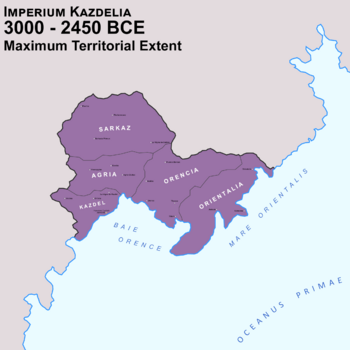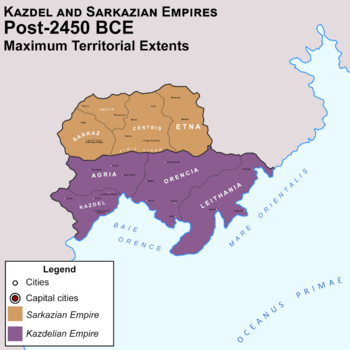Kazdelian Empire: Difference between revisions
No edit summary |
No edit summary |
||
| Line 156: | Line 156: | ||
The '''Kazdelian Empire''' ([[Kazdelian language|Kazdelian]] and modern [[Thalianessean language|Thalianessean]]: Ιμπεριυμ Καζδεληαε; ''Imperium Kazdeliae'', [[Ancient Thalianessean]]: Ιμπερασ Καζδέλος; ''Imperas Kazdelos'') was a prominent [[Teekaz|Teekazi]] nation-state and {{wpl|Empire|empire}} located in Southeast Anea, which existed from 3000 BCE, and up to its demise in 450 CE. Its territorial extent was massive; reaching up parts of present-day Satina District and Sartinaynia, as well as western and lower central Memester. | The '''Kazdelian Empire''' ([[Kazdelian language|Kazdelian]] and modern [[Thalianessean language|Thalianessean]]: Ιμπεριυμ Καζδεληαε; ''Imperium Kazdeliae'', [[Ancient Thalianessean]]: Ιμπερασ Καζδέλος; ''Imperas Kazdelos'') was a prominent [[Teekaz|Teekazi]] nation-state and {{wpl|Empire|empire}} located in Southeast Anea, which existed from 3000 BCE, and up to its demise in 450 CE. Its territorial extent was massive; reaching up parts of present-day Satina District and Sartinaynia, as well as western and lower central Memester. | ||
The composition of the Kazdelian Empire's population comprised predominantly of the human-like [[Kazdel (Teekazi race)|Kazdelian]]s, and by far one of the first advanced civilisations in the eastern Anean regions. After the annexation of the Thalianessean polities of ''Sarkh'az'' and ''Ta'alionesis'' in the north, the similarly related human-like [[Sarkaz (Teekazi race)|Sarkazian]]s became the second-most predominant population in the Empire. Kazdelian expansion continued up to 2790 BCE forwards, annexing [[Leithania (Teekazi race)|Leithanian]]s, another Teekazi race in the east, culminating in the establishment of the Empire's eastern Imperial City of special status, [[Orientalis]], in 2785 BCE. | The composition of the Kazdelian Empire's population comprised predominantly of the human-like [[Kazdel (Teekazi race)|Kazdelian]]s, and by far one of the first advanced civilisations in the eastern Anean regions. After the annexation of the Thalianessean polities of ''Sarkh'az'' and ''Ta'alionesis'' in the north, the similarly related human-like [[Sarkaz (Teekazi race)|Sarkazian]]s became the second-most predominant population in the Empire. Kazdelian expansion continued up to 2790 BCE forwards, annexing lands inhabited by the nomadic [[Leithania (Teekazi race)|Leithanian]]s, another Teekazi race in the east, culminating in the establishment of the Empire's eastern Imperial City of special status, [[Orientalis]], in 2785 BCE. | ||
[[Great Abydosian reforms|Abydosian reforms]] in 2450 BCE ushered a new era of the Kazdelian Empire that would last even up to its demise in 450 CE. The Imperial region of Sarkaz lobbied for independence and self-rule, which was granted by the [[Grand Parliament of Abydos|Grand Parliament]]. The [[Sarkazian Empire]] was formed consequentially and would become its own nation-state. At the same year, Orientalia was successfully renamed as ''Leithania'', to represent the predominant Teekazi race living there. As years passed, Abydos slowly waned in influence, triggering a [[Abydosian Stagnation|period of stagnation]] that would plague the Empire to its core. In 435 CE, the region of Leithania began calling for self-rule, but Abydos refused to entertain such request, despite Sarkazian advice to give the Leithanian race their own sovereignty. | [[Great Abydosian reforms|Abydosian reforms]] in 2450 BCE ushered a new era of the Kazdelian Empire that would last even up to its demise in 450 CE. The Imperial region of Sarkaz lobbied for independence and self-rule, which was granted by the [[Grand Parliament of Abydos|Grand Parliament]]. The [[Sarkazian Empire]] was formed consequentially and would become its own nation-state. At the same year, Orientalia was successfully renamed as ''Leithania'', to represent the predominant Teekazi race living there. As years passed, Abydos slowly waned in influence, triggering a [[Abydosian Stagnation|period of stagnation]] that would plague the Empire to its core. In 435 CE, the region of Leithania began calling for self-rule, but Abydos refused to entertain such request, despite Sarkazian advice to give the Leithanian race their own sovereignty. | ||
Infuriated and driven by patriotic calls for self-rule led to the declaration of independence by the Leithanians in 445 CE after the [[Leithanian Revolution]], establishing the [[Kingdom of Leithanien]], and starting the [[Leithanite Wars]]. Kazdelian armies tried to quell the rebellion-now-turned-war to no avail, suffering scandalous and humiliating military defeats, further plummeting Abydos's standing in the Empire and exacerbating the empire's serious fracturing, which had started in 400 CE. The [[Collapse of the Kazdelian Empire|collapse of the Kazdelian Empire]] was ultimately triggered in 450 CE, when a large Leithanian army marched into Orientalis after penetrating a Kazdelian defensive line, then [[Razing of Orientalis|pillaging and razing the city]] into the ground. It culminated shortly after in the same year when the Grand Parliament unilaterally dissolved the Empire and ousting the Kazdelian emperor, establishing the [[Parliamentary Governorate of Abydos]]. | Infuriated and driven by patriotic calls for self-rule led to the declaration of independence by the Leithanians in 445 CE after the [[Leithanian Revolution]], establishing the [[Kingdom of Leithanien]], and starting the [[Leithanite Wars]]. Kazdelian armies tried to quell the rebellion-now-turned-war to no avail, suffering scandalous and humiliating military defeats, further plummeting Abydos's standing in the Empire and exacerbating the empire's serious fracturing, which had started in 400 CE. The [[Collapse of the Kazdelian Empire|collapse of the Kazdelian Empire]] was ultimately triggered in 450 CE, when a large Leithanian army marched into Orientalis after penetrating a Kazdelian defensive line, then [[Razing of Orientalis|pillaging and razing the city]] into the ground. It culminated shortly after in the same year when the Grand Parliament unilaterally dissolved the Empire and ousting the Kazdelian emperor, establishing the [[Parliamentary Governorate of Abydos]]. | ||
Latest revision as of 23:24, 6 July 2024
This article is incomplete because it is pending further input from participants, or it is a work-in-progress by one author. Please comment on this article's talk page to share your input, comments and questions. Note: To contribute to this article, you may need to seek help from the author(s) of this page. |
| Note by Tsumiki: Any information here is subject to change. This article is a work in progress. |
Kazdelian Empire Ιμπεριυμ Καζδεληαε Ιμπερασ Καζδέλος Imperium Kazdeliae (Kazdelian) Imperas Kazdelos (Ancient Thalianessean) | |||||||||||||||
|---|---|---|---|---|---|---|---|---|---|---|---|---|---|---|---|
| 3000 BCE–450 CE | |||||||||||||||
|
Flag | |||||||||||||||
 Maximum extent from 3000 to 2450 BCE | |||||||||||||||
 The Kazdel and Sarkaz empires after 2450 BCE | |||||||||||||||
| Capital | Abydos | ||||||||||||||
| Religion | Early Schicksalism | ||||||||||||||
| Demonym(s) | Kazdelian | ||||||||||||||
| Government | Elective monarchy | ||||||||||||||
| Legislature | Grand Parliament of Kazdel | ||||||||||||||
| Historical era | Ancient Illuverendia | ||||||||||||||
• Established | 3000 BCE | ||||||||||||||
| 450 CE | |||||||||||||||
| Currency | Lyriae | ||||||||||||||
| |||||||||||||||
| Today part of | Illusia and Neverendia Memester Kyoki Chudoku Sartinaynia | ||||||||||||||
The Kazdelian Empire (Kazdelian and modern Thalianessean: Ιμπεριυμ Καζδεληαε; Imperium Kazdeliae, Ancient Thalianessean: Ιμπερασ Καζδέλος; Imperas Kazdelos) was a prominent Teekazi nation-state and empire located in Southeast Anea, which existed from 3000 BCE, and up to its demise in 450 CE. Its territorial extent was massive; reaching up parts of present-day Satina District and Sartinaynia, as well as western and lower central Memester.
The composition of the Kazdelian Empire's population comprised predominantly of the human-like Kazdelians, and by far one of the first advanced civilisations in the eastern Anean regions. After the annexation of the Thalianessean polities of Sarkh'az and Ta'alionesis in the north, the similarly related human-like Sarkazians became the second-most predominant population in the Empire. Kazdelian expansion continued up to 2790 BCE forwards, annexing lands inhabited by the nomadic Leithanians, another Teekazi race in the east, culminating in the establishment of the Empire's eastern Imperial City of special status, Orientalis, in 2785 BCE.
Abydosian reforms in 2450 BCE ushered a new era of the Kazdelian Empire that would last even up to its demise in 450 CE. The Imperial region of Sarkaz lobbied for independence and self-rule, which was granted by the Grand Parliament. The Sarkazian Empire was formed consequentially and would become its own nation-state. At the same year, Orientalia was successfully renamed as Leithania, to represent the predominant Teekazi race living there. As years passed, Abydos slowly waned in influence, triggering a period of stagnation that would plague the Empire to its core. In 435 CE, the region of Leithania began calling for self-rule, but Abydos refused to entertain such request, despite Sarkazian advice to give the Leithanian race their own sovereignty.
Infuriated and driven by patriotic calls for self-rule led to the declaration of independence by the Leithanians in 445 CE after the Leithanian Revolution, establishing the Kingdom of Leithanien, and starting the Leithanite Wars. Kazdelian armies tried to quell the rebellion-now-turned-war to no avail, suffering scandalous and humiliating military defeats, further plummeting Abydos's standing in the Empire and exacerbating the empire's serious fracturing, which had started in 400 CE. The collapse of the Kazdelian Empire was ultimately triggered in 450 CE, when a large Leithanian army marched into Orientalis after penetrating a Kazdelian defensive line, then pillaging and razing the city into the ground. It culminated shortly after in the same year when the Grand Parliament unilaterally dissolved the Empire and ousting the Kazdelian emperor, establishing the Parliamentary Governorate of Abydos.

